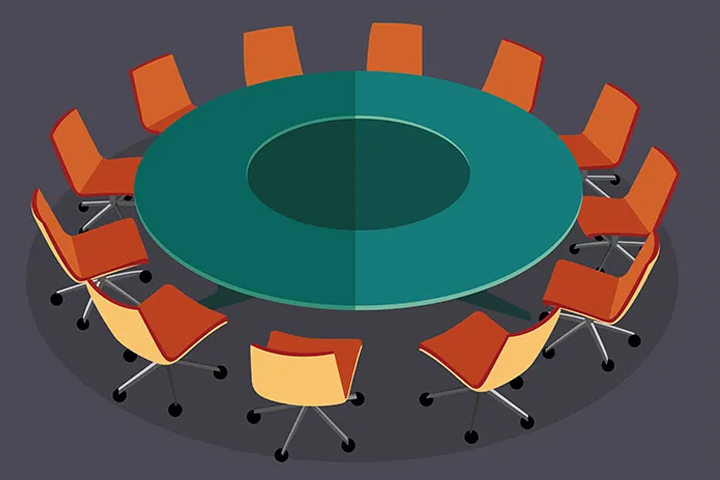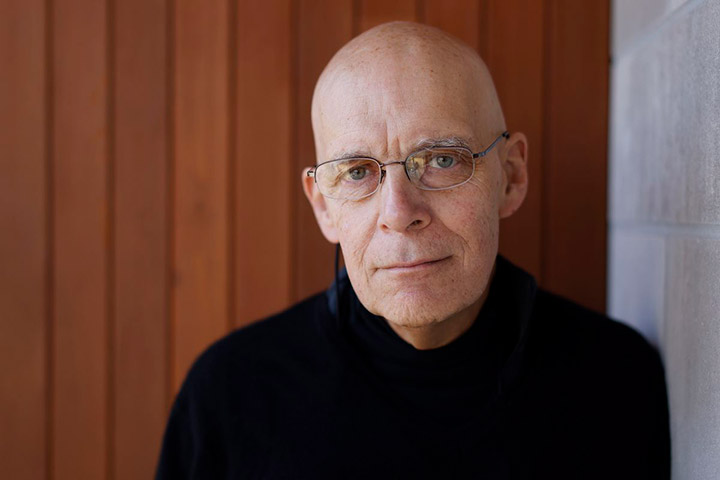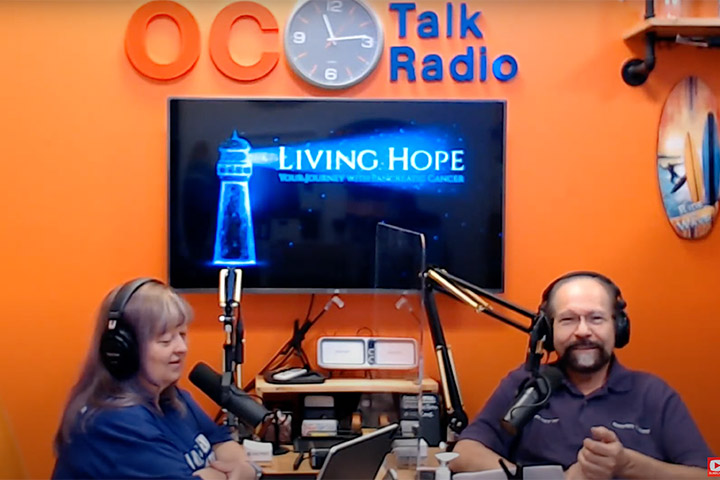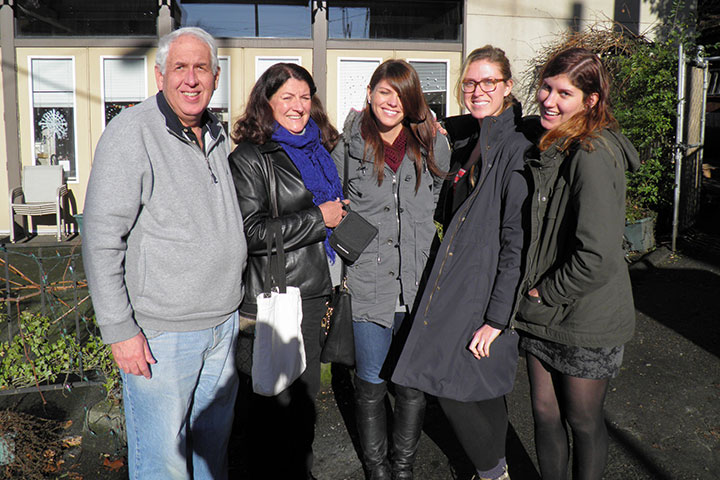At the Table: Taking Care During the COVID-19 Pandemic

While the COVID-19 pandemic has quieted in the Northeast and Pacific Northwest, it very active in Texas, Arizona, Georgia, and Florida, places that did not see as much virus spread in April and May.
We asked pancreatic cancer survivors from around North America how the pandemic has impacted them and what they are doing to stay safe. At the table are a group of active advocates, including John Moisan from South Dakota; Camille Moses from south Florida; Sandy Robis from Ontario, Canada; William Ramshaw from eastern Washington; and Steven Merlin from the New York metropolitan area.
How are you taking care of yourself in the COVID-19 pandemic? Are you staying in and using delivery services to get food?
Camille: I haven’t socialized much since March 7th, only going out to get food and other necessities. My only indulgence was getting my hair done at the end of June. But right now (mid-July) south Florida is one of the worst places to be. So, I am more concerned, and even panicky at times.
Sandy: I began self-isolating on March 11th. Fortunately, my dear neighbor did my grocery shopping and in return, I made meals that I shared with them—a win/win all around! My family also brought food—we did 10-minute social distancing visits on my driveway. Thankfully, my pharmacy delivers my meds.
I wipe down everything that comes in and wash my fruits and vegetables before I put them away. And I wash my hands like a maniac, do not touch my face, and have quite the collection of face coverings.
William: For the most part, I am staying around my home. We live in the country so using food delivery services really isn’t an option. Cooking at home offers a great way to experiment with food—there is something so satisfying about trying a recipe and having it come out looking like the picture.
Steven: I’ve always been a proactive person, so I normally keep ample supplies of non-perishable foods and health and consumer items at home, and only have to shop for perishable foods and prescription medicines. When I do need to do bulk shopping, I go at the quietest time, when there are few customers and no waiting at checkout. In fact, I use the self-checkout as much as possible. All three supermarkets in my area enforce the mask-wearing policy, sanitize the carts, and provide hand sanitizer stations.
At home I segregate my new packages rather than disinfect them. I generally use them more than 72 hours after purchase. The one exception is fresh fruits and vegetables, which are immediately washed when brought into the house.
Have you put off medical visits?
Sandy: When I started self-isolating I checked in with my medical team ASAP, to get their advice on what I should and should not be doing. One thing I did was get my medications topped up in case there were shortages. My doctors said I was doing all the right things by adhering to public health guidelines and just being extra careful. Stress can do crazy things to your mind and body, especially if your diabetes is hard to control, so I had to watch my blood glucose levels even more carefully. My CT scans and lab work were never cancelled but I have my doctor appointments by phone or virtually.
William: I think twice or even three times about going to see any of my doctors or going to a lab for a blood draw, because this is where the sick people go. On the upside, it has been much easier to get an appointment. Telemedicine is OK but I would rather see my doctors face-to-face because you lose the richness of the face-to-face experience.
Steven: I feel the disadvantages of delaying dental and/or medical appointments outweigh the benefits. I have kept medical appointments throughout the pandemic, using public transportation to get from my home to Manhattan. This was well before masks were required, let alone suggested. I planned my appointments to avoid rush hour crowds and sat far away from everyone.
A cavity was detected during a routine dental cleaning, shortly before the lockdown in New York and New Jersey. I was able to locate a dentist close to home who followed stringent cleanliness and safety protocols.
My oncology appointments from late March onward were via telemedicine. However, I needed an in-person visit due to increased symptoms of fatigue from anemia, caused by two years of strong chemo. The cancer center was restricted to patients on active chemo, with no visitors allowed. The waiting room was arranged for social distancing, everyone had to wear masks, and ample hand sanitizer was available. Scheduling was well-coordinated so that no one sat in the waiting room longer than necessary.
Are you able to get outside or stay busy?
Camille: Thank goodness I have a yard and pool! We sometimes take walks in our neighborhood, but we always wear our masks—in fact I wear two masks. I also carry wipes—I have carried then since I was in treatment because I still have a low white blood cell count and low platelets, among other health issues.
Steven: I have kept my exercise routine of walking between three to five miles daily since the pandemic started. I like to garden and have spent considerable time in my yard. When I have to make trips to a local garden center, I usually go in the early morning, as it tends to be less crowded.
I wear a mask whenever it is not possible to practice social distancing. I do not wear a mask during solitary walks or bike riding but I carry one in my pocket in case I need it.
William: Besides the obvious medical issues that come with being a six-year pancreatic cancer survivor, I find the lack of positive stimulus to be challenging. Watching the news is a quick fix but like a sugar high it is gone all too quickly. With COVID cases surging once again, there is so much going wrong right now, so watching the news only exacerbates the feeling of hopelessness. To counterbalance this, I have discovered free YouTube videos on a wide range of topics. I am also trying to read more because it inspires me to write more, which allows me to offer hope and encouragement to those who are facing pancreatic cancer.
I try to get outside daily. One of the best pieces of advice I have gotten recently is if you don’t have anything to do, create something. This spring I power washed my deck, restained it, aerated and fertilized my yard, put in raised beds in my large garden, and repaired or replaced several things around the house that were broken, among other things. On days I can’t get out, I try to go to the gym. This is probably not recommended especially for those in treatment, but not getting enough exercise has its health risks. I take as many precautions as possible at the small gym I go to. Before I use a machine, I clean it thoroughly. I am careful not to touch my face. Once home first thing I do is change and shower.
Have you been seeing family and friends from a distance?
John: Our children and grandchildren are in Denver, Fayetteville (North Carolina), Houston, and Sioux Falls (South Dakota). All those places are hotbeds of COVID-19. It’s hard not to be able to go see them but my wife and I are both compromised in terms of our health. Flying is risky and driving requires staying in motels where we are not sure the proper cleaning has occurred, so traveling anywhere is worrisome.
We are willing to take the risk of seeing our kids and grandkids, but they worry more about us than we do about ourselves. However, we have seen them on occasion, and have disregarded social distancing—we hug and stand close.
Some of our friends have similar age or health issues, and they are literally paralyzed with fear of COVID-19. Their life in lockdown is terrible. We are NOT paralyzed with fear. . . we’re just careful. But we are very bored as well.
Sandy: Just because you have to physically distance doesn’t mean you have to socially undistance! During isolation I stayed in touch virtually with family and friends and my fellow pancreatic cancer warriors, but I also reconnected with people I hadn’t spoken to in years—a huge plus! I used the time to do more advocacy, to continue to help other survivors and caregivers, and to get my story out there in the hopes of inspiring others to continue to fight the fight. This included a podcast with Project Purple and of course my story with Let’s Win!
I go out more often now (July) but am extremely careful—I was an early adopter, with surgical masks and gloves left over from my chemo days. I stay clear of any high-risk places or people that don’t observe public health advice—I certainly don’t want to unknowingly infect another person and I would hope others would extend the same respect to me.
William: Right now, everyone is being extra vigilant to stop the spread of COVID-19, especially to someone like me who could die from it. My family is an hour or more away, so they rarely visit. And lunch or coffee with good friends is on hold.
Steven: I check on several elderly friends either by telephone or by stopping in. With friends spread across the country and in Europe, video calls work well. I use the internet for reading about the latest advances in pancreatic cancer, doing online courses such as foreign languages, and viewing Do It Yourself project videos. I also keep in contact with other pancreatic cancer patients and survivors to make sure they are well and participate in monthly pancreas support group meetings on Zoom hosted by the Pancreas Center of NewYork-Presbyterian Medical Center in New York.
When visiting close friends, masks and social distancing protocols are followed. Dining is outside and usually not more than six persons.
Has your pancreatic cancer treatment impacted your view of COVID-19?
Sandy: As a two-time cancer survivor (breast and pancreatic) and a Type 3c diabetic, I need to be extra careful. But I honestly didn’t freak out at all—when you beat cancer twice, you understand how important it is to take care of yourself and listen to the health professionals while also continuing to live life.
John: Neither my wife (who had a stroke in 2010) nor I are “afraid” or “scared” of the coronavirus killing us like we would have been before our health was compromised. It’s interesting that once you have looked death in the eye (like both of us have), your “FEAR” goes away. By the grace of God I’ve managed to beat back one of the most horrid diseases on this planet and it’s built a new spirit in me that I never knew existed. I am proud and I think pancreatic cancer has helped me find the “real me.”






